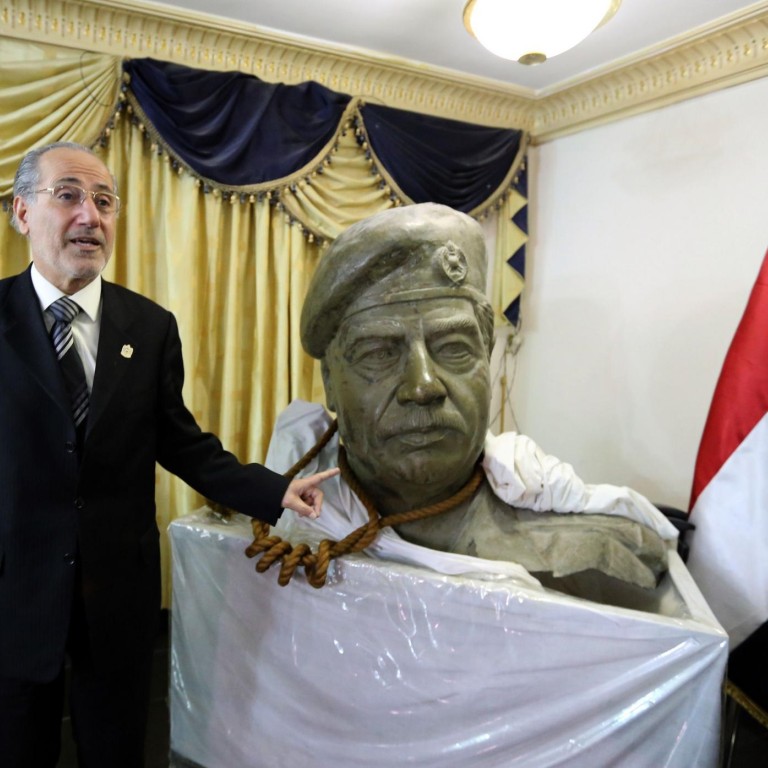
Saddam Hussein's executioner recalls anniversary of dictator's death
The man responsible for hanging former Iraqi president recalls an unrepentant dictator who remained strong until his execution
Mowaffak al-Rubaie sits in his office with a statue of Saddam Hussein behind him, the rope used to hang the dictator around its neck, recalling his final minutes.
The former national security adviser, who oversaw Saddam's December 30, 2006, execution, said the late president never expressed any regret.
"A criminal? True. A killer? True. A butcher? True. But he was strong until the end," he said.
"I received [Saddam] at the door. No one entered with us - no foreigners, and no Americans," al-Rubaie said in an interview at his office in the Kadhimiyah area of north Baghdad, near the prison where the execution took place seven years ago.
I didn’t hear any regret from him, I didn’t hear any request for mercy from God
"He was wearing a jacket and a white shirt, normal and relaxed, and I didn't see any signs of fear.
"Of course, some people want me to say that he collapsed or that he was drugged, but these facts are for history," al-Rubaie said.
"I didn't hear any regret from him, I didn't hear any request for mercy from God from him, or request for pardon.
"A person who is about to die usually says, 'God, forgive my sins - I am coming to you.' But he never said any of that."
Hussein, who was president of Iraq for more than two decades marked by brutal repression, disastrous wars and punishing international sanctions, was hanged after being found guilty of crimes against humanity for the 1982 killing of 148 Shiite villagers in Dujail.
He ruled from July 1979 until the March 2003 US-led invasion of Iraq, and was found by American forces hiding in a hole on a farm in December of that year.
Saddam was executed three years later after a summary trial.
Some Iraqis, particularly Sunni Arabs, look back fondly on the time of Saddam's rule, especially the periods of internal stability that stand in contrast to the brutal violence that has plagued the country since his overthrow.
Saddam is also held in high regard by some Arabs for his 1980-88 war with Iran, his confrontations with the United States, his strikes against Israel, and his composure during his execution.
"When I brought him, he was handcuffed and holding a Koran," said al-Rubaie.
"I took him to the judge's room, where he read the list of indictments, as Saddam repeated: 'Death to America! Death to Israel! Long live Palestine! Death to the Persian magi!" Al-Rubaie then took Saddam to the room where he was to die.
"He stopped, looked at the gallows, then he looked me up and down … and said: 'Doctor, this is for men'."
When it was time for Saddam to mount the gallows, al-Rubaie and others dragged him up the steps as his legs were still bound.
Before he was hanged, witnesses shouted "Long live Imam Mohammed Baqr al-Sadr!" and "Moqtada! Moqtada!" - references to an opponent of Saddam who was killed during his rule, and the dead man's relative, who commanded a powerful militia.
Saddam replied: "Is this manhood?"
Al-Rubaie said he pulled the lever to hang Saddam, but it did not work. Another person he did not name then pulled it a second time, killing him.
Just before he was hanged, Saddam began to recite the Muslim testament of faith but he was hanged before he could say the final words.
Al-Rubaie said Saddam's execution was set in motion after a video conference between Prime Minister Nouri al-Maliki and then US president George W. Bush, who asked the Iraqi prime minister: "What are you going to do with this criminal?"
Maliki replied: "We hang him."
Bush gave him a thumbs up, signalling his approval.
